- Home
- Jay Bonansinga
The Walking Dead Page 14
The Walking Dead Read online
Page 14
“The Governor wants to keep it on the down-low, he doesn’t want people to worry about it.”
She sighs. “I’m not worried about it, I was just curious if he found anything out.”
“I don’t know, and I don’t want to know.”
“What the hell is the matter with you?”
Anger flares in Martinez’s gut, traveling up his spine and drying his mouth. He wants to strangle this busybody. He grabs her by the shoulders. “Listen to me. I got enough problems, I have to deal with this shit, too!? Stay out of it. Just leave it alone!”
Lilly pulls away. “Whoa, Kemosabe! Back off.” She rubs her shoulder. “I don’t know who pissed in your cereal this morning but you can take it out on somebody else.”
Martinez takes deep breaths, looking at her. “Okay, look. I’m sorry. But we’re on a need-to-know basis here. The Governor knows what he’s doing. If there’s something we need to know, he’ll tell us.”
Lilly waves him off, turns, and walks away in the rain, mumbling, “Whatever.”
Martinez watches her vanish in the mist. “He knows what he’s doing,” he says again, softly, under his breath, as though trying to convince himself.
ELEVEN
The rains continue, an unremitting deluge over south central Georgia for nearly three straight days. It’s not until midweek that the weather moves on, leaving flash floods and downed power lines in its wake all the way to the Eastern seaboard. The land around Woodbury is left drenched and bound up in mud holes and washouts, the fallow fields to the south so sodden and inundated that the men on the wall notice clusters of walkers driven out of the woods, wallowing in the flooded areas like giant glistening leeches climbing on top of each other. It’s like shooting fish in a fishbowl for the .50 caliber gunners on the northeast and southeast corners of the barricade. But other than these noisy, gruesome little displays of what the Governor has started calling “waste management,” the town of Woodbury remains almost eerily calm that week. In fact, it’s not until the end of that week that Lilly notices something amiss.
Up until then, she keeps a low profile, spending most of her days inside, honoring Martinez’s directive to keep any news of hostile strangers in their midst to herself. She passes the time reading, watching the rain, thinking, and lying awake at night agonizing over what to do about Austin. On Thursday, he shows up at her door with a bottle of wine that he nicked from the old storage room at the courthouse, along with a bouquet of Russian sage he picked down by the post office, and she is so touched by the gesture that she lets him in but insists that he avoid the subject of their relationship or any mention of that night they went over the line. He seems happy to just spend time with her. They polish off the entire bottle of wine playing Pictionary—at one point, Austin makes her laugh so hard she does a spit-take when he reveals that his drawing, which appears to be a fried egg, is his brain on drugs—and he doesn’t leave until the gray light of dawn is playing at the seams of the boarded windows. The next day, Lilly has to admit to herself that she likes this guy—regardless of the awkward circumstances—and maybe, just maybe, she would be open to the possibilities.
Then Sunday morning comes. Exactly one week after the fateful night, Lilly awakens with a start sometime before dawn. Something amorphous and unformed in the back of her mind has been bothering her, and for some reason—be it something she dreamed, or something that percolated down through her subconscious over the course of that week—it strikes her full force right then, that morning, like a ball peen hammer right between the eyes.
She jumps out of bed and hurries across the room, tearing open a three-ring binder lying on a makeshift desk of two cinder blocks and a plywood panel. Frantically she rifles through the pages.
“Oh no … no, no, no,” she utters under her breath as she searches through her calendar. For almost a year, she has been religiously keeping track of the date. For many different reasons. She wants to know when the holidays fall, she wants to know when the seasons turn, and most of all, she simply wants to keep in touch with the old order, with civilized life, with normalcy. She wants to stay connected with the passage of time—although there are many in this dark era who have given up, who don’t know their Arbor Day from their Yom Kippur.
She looks at the date and slams the calendar shut with a gasp.
“Oh shit … fuck … shit,” she mutters to herself, backing away from the desk and whirling around as though the floor is about to drop away from under her feet. She paces a nervous circle in the dark bedroom for a moment, her thoughts swimming and crashing into each other. It can’t be the twenty-third. It can’t be. She’s imagining this whole thing. She’s just paranoid. But how can she be sure? How can anybody be sure of anything in this fucked-up Plague World? There must be something she can do to set her mind at ease—to prove to herself she’s just being paranoid. All at once, she freezes and gets an idea.
“Okay!”
She snaps her fingers, and then rushes over to the old battered metal armoire in the corner where she keeps her coats and guns and ammo. She grabs her denim waistcoat, her twin Ruger .22s, the silencers, and a pair of twenty-five-round banana clips. She puts on her coat and then screws on the silencer attachments and shoves the guns behind her belt. She stows the clips in her pockets, takes a deep breath, raises her collar, and heads out the door.
Her breath shows in the predawn air as she emerges from her building. The town is still asleep, and the sun is just peeking out from behind the east woods—sending angelic rays of light across low-lying motes of fog—as Lilly crosses the street and pads quickly down the narrow sidewalk toward the old, derelict post office.
Just beyond the post office—on the other side of the south wall, outside the safe zone—stands a ransacked drugstore. Lilly needs to get into that store, just for a second, in order to find out if she’s crazy or not. There’s only one problem.
It’s outside the wall, and with the passing of the rainstorm, walker activity has picked up out there.
* * *
In the dimly lit subbasement beneath the racetrack arena, Bruce hears the telltale banging on the inside of the last garage door on the left.
He braces himself for what he’s about to see, leans down, unsnaps the lock, grasps the release, and yanks the door up on its congealed rollers. The door shrieks. The opening reveals a dark cement enclosure once used to store greasy chassis and spare parts—now a place of degradation and pain—and the Governor standing in the gloom, breathless from all the hard work.
“That’s entertainment,” he mutters, his face shiny with sweat, the dark wet spots under his armpits and the blood on his hands worse than they were after the last session two days ago. He worked on the woman all night—the third round of torture this week—and now the fatigue and the toll it’s taking on the man show in his sunken gaze.
For a brief instant, Bruce glimpses the ragged figure on the floor behind the Governor. Her torso hangs inches above the floor, the ropes barely keeping her aloft, her braids dangling, fluids dripping off her swollen face. Her narrow shoulders heave rhythmically, lungs gasping for air, her nude lower half crumpled like a broken doll. She is barely alive—at least at first glance—although on closer inspection, one might note a furnace burning behind her hemorrhaged eyes, a nuclear reactor of rage keeping her awake, keeping her clinging to a thin hope of vengeance.
“Close it,” the Governor says, grabbing a towel draped over Bruce’s shoulder.
Bruce obliges, slamming the rolling door to the deck with a metallic clang.
The Governor towels off his face. “She ain’t ever gonna talk. How many times we been at it now—three, four—I lost count.” He tosses the towel. “What about the kid? He break yet?”
Bruce shakes his head. “Gabe says he’s been hearing everything through the wall, says he’s been blubbering like a baby, day in and day out, and hasn’t let up since you started in on her.”
The Governor sniffs, stretching his overworked neck muscles, c
racking his bloody knuckles. “But he didn’t give anything up, did he?”
Bruce shrugs. “According to Gabe, he just bawled and bawled and that’s about it. Wouldn’t talk.”
“That tears it.” The Governor takes deep breaths, thinking, turning things over in his mind. “These people are tighter than I thought, tough fucking nuts to crack.”
Bruce considers it. “Can I make a suggestion?”
“What’s that?”
Bruce shrugs again. “In the joint, they break people in solitary.”
The Governor looks at him. “So?”
“So what I’m thinking, we just keep ’em locked up, separated, you know, like solitary fucking confinement. Might be the easiest way to do it.”
“This ain’t no prison, Bruce, I got a town to—” The Governor blinks, cocking his head at a sudden revelation. “Wait a minute.”
Bruce looks at him. “What is it, boss?”
“Wait … hold on a second.”
“What?”
The Governor stares at the big black man. “Didn’t Gabe say those riot suits they came dressed in was the kind of shit they use in prisons?”
Bruce silently nods, looking around the corridor, thinking about it.
The Governor starts toward the stairs, muttering as he goes. “Now that I think of it, that Rick dude was wearing a prison jumpsuit under his gear.”
Bruce hurries after him. “Where you going, boss?”
The Governor is already climbing the steps, calling over his shoulder. “Clean that bitch up … and then get Gabe … and meet me at the infirmary. I think I got a better way to do this!”
* * *
Lilly pauses next to the wall, heart racing, the sun now fully risen, the early morning rays of light hammering down on the back of her neck. Fifty yards away, one of Martinez’s men—his husky form silhouetted against the dawning sky—strolls along a makeshift catwalk.
Lilly waits until the guard passes behind a vent stack, and then makes her move.
She quickly scuttles up and over the wall, landing hard on a parkway of gravel on the other side. The impact of her boots on the rocks makes a loud crunch, and she crouches down for a moment—her pulse quickening—waiting to see whether or not the guard notices her.
After a moment of breathless silence, she silently duck walks across the gravel road and slips behind a burned-out building. She checks her gun, jacking the slide. She keeps it at her side as she moves on, plodding down a side road strewn with wreckage and heaps of decomposing, headless walkers. The stench is extraordinary.
The cold wind blows the smell around her like a net as she passes the post office—staying low, creeping silently past old torn posters of happy postmen handing colorful packages to children, and graffiti-splashed placards of smiling retirees collecting stamps. She hears shuffling noises behind her—leaves on wind, maybe—and doesn’t look back.
She keeps heading south.
The bombed-out remains of Gold Star Sundries and Drugs sits at the end of the road, a tiny box of crumbling red brick with a bullet-riddled, boarded front window. The old R/X sign—a big mortar and pestle—hangs by frayed cables, twisting in the breeze. She hurries up to the entrance. The door is jammed shut, and she has to plow through it with one shoulder.
She bursts into the store’s dark interior, the glass from the broken door raining down on the floor. Her heart thrums in her chest as she surveys the disaster area that once offered cough medicine, denture creams, and cotton balls to farm wives and sniffling locals.
The aisles have been completely ransacked—the shelves scoured clean, only a few empty cartons and puddles of unidentified fluids lying here and there. She weaves through the detritus and heads toward the pharmacy counter in the shadowy rear aisles.
A noise gets her attention to her immediate right—a hiss of air, a bottle overturning—and her gun immediately goes up. She sees a blur of yellow fur. She lets up on the hammer when she realizes it’s a feral cat—the ragged creature darting between fallen displays of mouthwash and teeth whitener with a mouse in its jaws.
Lilly lets out a thin breath of relief, turns back toward the pharmacy counter … and she suddenly screams.
The old pharmacist lumbers out of the shadows next to her with reaching arms and blackened, gnarled hands curling into claws—his gigantic rotting mouth working like a wood chipper. His long, jowly face is the consistency of bread pudding, filmed in mildew the color of old rust, his milk-pod eyes as huge as hard-boiled eggs. He wears a white coat desecrated by blood and bile.
Lilly jerks backward, raising the gun and knocking over a display of dog food.
She falls on her ass, cans clattering to the floor all around her, the air knocked out of her lungs, and she starts firing. The clap of silenced gunfire sparks and flares and reverberates through the tight space, half the rounds going high, shattering fluorescent tubes. But half the slugs go into the balding head of the pharmacist.
Cranial bones shatter and fly, blood and tissue spattering the empty shelves. The giant biter falls like an old oak, landing directly on Lilly. She screams and writhes beneath the reeking dead weight of the corpse, the stench unbearable. Finally she rolls free.
For several frenzied, silent moments, she crouches there on the floor next to the fallen biter. She swallows back the repulsion, the urge to flee this hideous dark store, the voice in the back of her head telling her she’s crazy, she’s insane to be risking her life for this ridiculous little bit of personal reconnaissance.
She drives the thoughts away and manages to get her bearings back.
The pharmacy counter lies in darkness twenty feet away. Lilly cautiously negotiates the rear aisle, her eyes adjusting slowly to the gloom. She sees the counter, swamped with sticky, drying fluids, wadded documents, and mold so thick it looks like a coat of fur over everything.
She squeezes through the pass gate, and starts rifling through the meager contents of the pharmacy shelves. Nothing but useless drugs and tinctures remain unscathed by the looters—acne medicines, hemorrhoid treatments, and cryptically named medicines nobody bothered to identify—all the valuable central nervous system drugs and opiates and painkillers long gone. But she doesn’t care.
She’s not looking to get high or knock herself out or block pain.
After a seemingly endless, agonizing search, she finally finds what she’s looking for on the floor under the computer terminal, in a pile of discarded boxes and plastic pill vials. There’s only one box left, and it looks as though someone stepped on it at some point. Smashed flat, its top broken open, the container still holds its contents in a sealed, intact blister pack.
Lilly stuffs it into her pocket, rises to her feet, and gets the hell out of there.
Fifteen minutes later, she has returned to her apartment with the kit.
Five minutes after that, she waits to see if her life is about to change.
* * *
“He was a good man,” a muffled voice is saying on the other side of the closed infirmary door—unmistakable in its sardonic tone, its faint accent, its weary sarcasm—clearly the voice of the estimable Dr. Stevens. “Emphasis on was.”
The Governor stands outside the door to the infirmary with Gabe and Bruce. The three men pause before going in, listening to the low murmuring on the other side of the door with great interest.
“We found this town pretty early on,” the doctor’s voice continues. “The National Guard station, the narrow alleys—we decided we could defend this place. So we staked our claim.” There’s a brief beat of silence, the faint sound of water running. “Started out he was tough,” the voice goes on, “but he got the job done.”
The Governor balls his fists as he listens, the anger stiffening his spine, mixing with the sheer adrenaline of discovery.
“Philip emerged as the leader of our group very quickly,” the voice is saying. “He did what had to be done, what needed to be done to keep people safe. But after a while—”
The rage jolts up
the Governor’s spinal cord, tingles in his fingers, fills his mouth with bitter, flinty bile. He leans toward the door to listen more closely.
“—it was clear to some of us that he was doing this more out of enjoyment than the need to protect us. It was clear he was little more than an evil bastard. I can’t even talk about his daughter.”
The Governor has heard enough. He reaches for the doorknob but something stops him.
On the other side of the door, a deeper, huskier voice with a thicker working-class Kentucky accent is speaking: “Why do you allow it to go on? The fights? Feeding the zombies?”
The doctor’s voice: “What do you think he’d do to anyone who opposed him? I hate the son of a bitch but I can’t do anything. Whatever else he does … he keeps these people safe. That’s enough for most people.”
The Governor swallows back the urge to break the door down with a battering ram and kill them all.
The doctor: “As long as there’s a wall between them and the biters they’re not too concerned with who’s with them on their side of the wall.”
Philip Blake kicks the door in, the lock-bolt snapping off and flying across the room, skipping across the tile floor like a spent shell casing. The door bangs against the adjacent wall, making everybody in the room jump.
“Well said, Doctor,” the Governor says as he calmly saunters into the infirmary, followed closely by his associates. “Well said.”
* * *
If it’s possible for an entire room to bristle with static electricity, that’s exactly what happens in that ensuing instant in which the eyes of everyone—Stevens, the stranger sitting on the bed, Alice over by the sink—snap toward the thin man strolling into the infirmary with hands on his hips like he owns the place. The coolly amused expression on the Governor’s face is belied by the sullen, baleful expressions on the faces of Bruce and Gabe, who enter like attack dogs on the heels of their master.
“What do you want?” the doctor finally manages in a taut tone.
“You said to come in today, Doc,” the Governor replies with the casual congeniality of just another patient arriving for a checkup. “You wanted to change my bandage?” He points helpfully at his wounded ear. “Remember?” The Governor then shoots a glance at the intruder, now frozen in a sitting position on the bed across the room. “Bruce, point a gun at Lefty over there.”

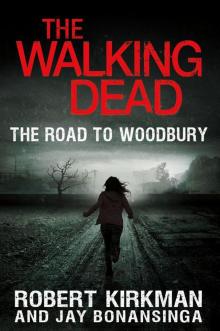 The Walking Dead: The Road to Woodbury
The Walking Dead: The Road to Woodbury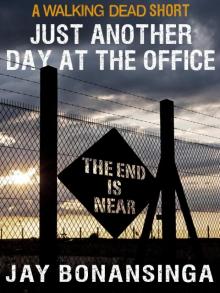 Just Another Day at the Office
Just Another Day at the Office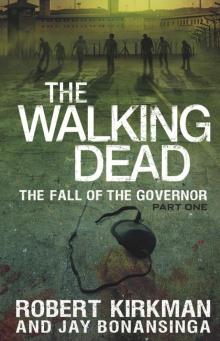 The Fall of the Governor: Part One
The Fall of the Governor: Part One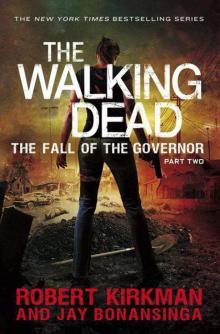 The Walking Dead: The Fall of the Governor: Part Two
The Walking Dead: The Fall of the Governor: Part Two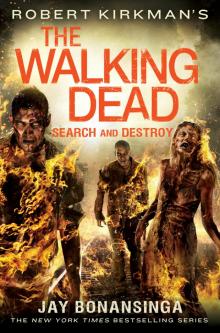 Search and Destroy
Search and Destroy Invasion
Invasion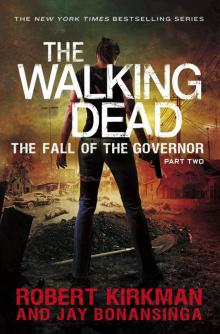 The Fall of the Governor: Part Two
The Fall of the Governor: Part Two The Walking Dead Collection
The Walking Dead Collection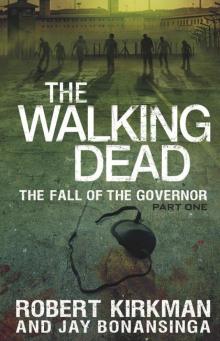 The Walking Dead
The Walking Dead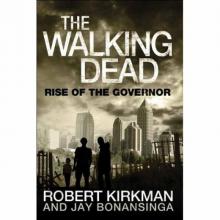 Descent
Descent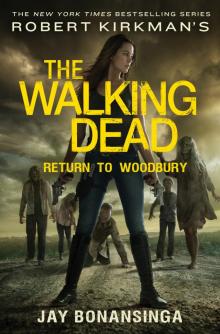 The Walking Dead: Return to Woodbury
The Walking Dead: Return to Woodbury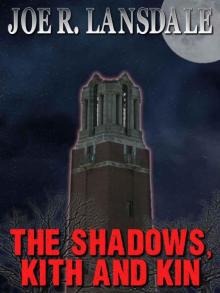 The Killer's Game
The Killer's Game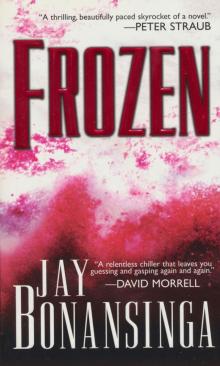 Frozen
Frozen Shattered
Shattered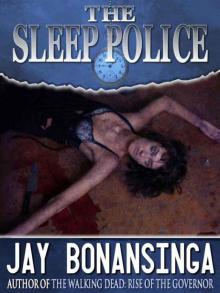 The Sleep Police
The Sleep Police Perfect Victim
Perfect Victim